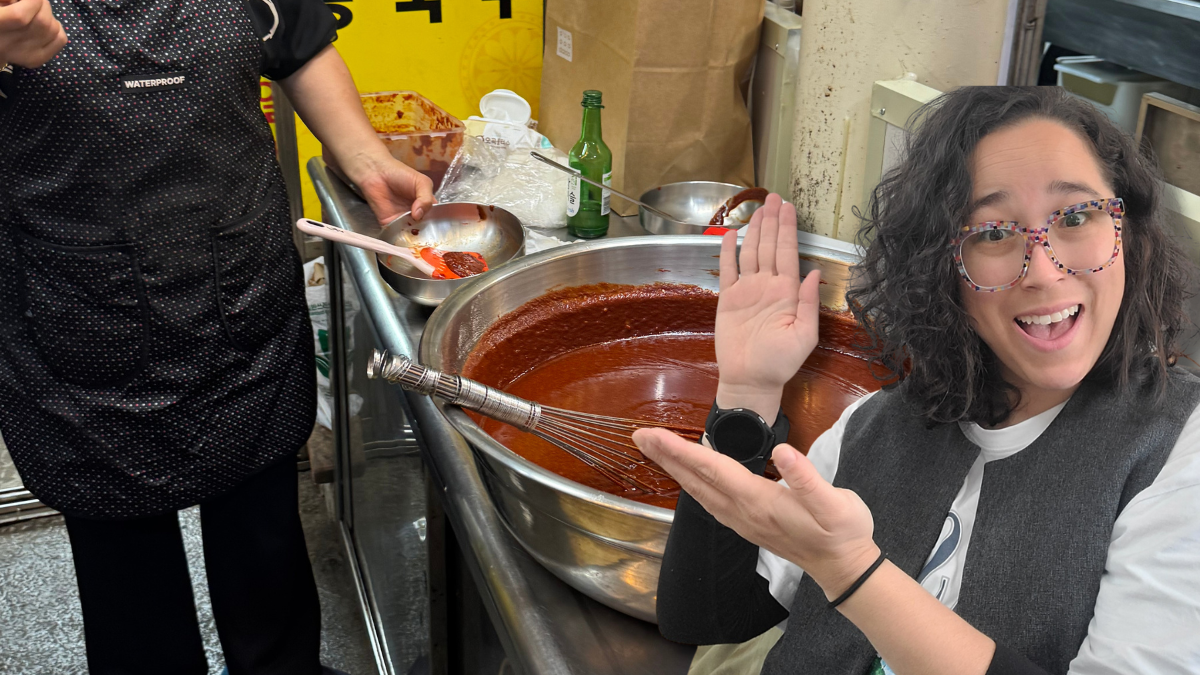
What is the meaning of Arirang?
When you live or travel in Korea, you may hear people talk about ‘Arirang’ but what is the meaning? People may use this word in many different ways that leave you wondering, “Exactly what is this? What specific thing does ‘Arirang’ represent?” Well, it turns out, that Arirang could be many things and it started with a song. Keep reading to the end, it’s worth it.
Arirang the Song
The first meaning of “Arirang” is simple, it’s a song. In fact, it’s the most popular traditional folk song in Korea. However, when talking about “Arirang” Koreans will tell you that it’s not just a popular song. Instead, hearing and singing the song reaches the soul of Korea or ‘Han’. The song and the emotions you feel listening to the song encapsulate the spirit, history, and emotions of the Korean people.
History of “Arirang” and Its Meaning
Historians can’t clearly trace the origins of the song “Arirang” however, some believe it originated many centuries ago in Jeongseon, Gangwon-do. The people sang a song that tells a tale of love, separation, and the longing for reunion. Its poignant lyrics and haunting melody express the universal themes of sorrow, love, and hope, making it resonate deeply with those who hear it.
Interestingly, there are several regional variations of “Arirang,” each with its own distinct melody and lyrics, reflective of the local culture and experiences of the specific regions in Korea. Among the most notable versions are the Jeongseon Arirang, Miryang Arirang, and Jindo Arirang.
Additionally, historians do not agree on the exact meaning of the word Arirang. No one knows exactly what the particular word means, but they know how it feels.
UNESCO Intangible Cultural Heritage
In 2012, the significance of “Arirang” was globally recognized when UNESCO inscribed it on the Representative List of the Intangible Cultural Heritage of Humanity. This recognition was not just for the song itself but also for the cultural practices, performances, and traditions associated with it.
Source of Comfort During Japanese Occupation
Throughout history, “Arirang” has been a source of inspiration, comfort, and resistance. During the Japanese occupation of Korea (1910-1945), it became an unofficial anthem of protest and hope among Koreans. Today, the song continues to hold a special place in the hearts of Koreans, often evoking feelings of nostalgia and pride.
Of course, in general conversation, people might use Arirang to talk about a few other things as well. Let’s dig into that.
Arirang the Movies
In conversation, people also might refer to a movie when they say “Arirang”. The most recent movie with this title was a 2011 movie. The film is a deeply personal and introspective documentary directed by renowned South Korean filmmaker Kim Ki-duk. Departing from his previous works, this film offers an intimate look into Kim’s own psyche, struggles, and contemplations on life and cinema.
Shot predominantly in his isolated cabin, the movie becomes a therapeutic process for Kim, as he reflects on a near-fatal accident on a previous film set that deeply traumatized him, leading him to a self-imposed exile from filmmaking for three years. “Arirang” is named after the iconic Korean folk song, symbolizing the director’s emotional journey of heartbreak, introspection, and eventual reconciliation with his past.
Raw, unfiltered, and at times, emotionally jarring, the film blurs the boundaries between reality and fiction. “Arirang” stands as a testament to the cathartic power of art, offering viewers an unvarnished window into the soul of one of Korea’s most provocative filmmakers.
Keep in mind that this is only the most recent Arirang movie. There is more to learn about so feel free to go down that rabbit hole.
Arirang the Broadcasting Network
As mentioned before, many English-speaking international residents mean Arirang TV when they say Arirang. They might not even know about the song or movie. Arirang TV is South Korea’s international English-language broadcasting network. Arirang was established in 1996 to promote a deeper understanding of Korea’s culture, history, and contemporary issues among global audiences. The organization offers a diverse array of programming, including news, cultural shows, documentaries, and entertainment.
Arirang TV plays a pivotal role in bridging the gap between Korea and the world. Which is why so many international residents know about it first. With Arirang’s content available in over 100 countries, the organization provides insightful perspectives on global and regional events, as well as highlighting Korea’s dynamic culture, Arirang stands as a beacon of cultural diplomacy in the digital age.
Arirang the Festival
This brings us to the Arirang Festival in Jeongseong, Gangwon-do. The Arirang Festival is a vibrant celebration of South Korea’s iconic folk song, “Arirang.” Held annually, this event pays homage to the song’s profound significance in Korean culture, embodying tales of love, separation, and longing. The festival showcases diverse performances, from traditional dance to contemporary interpretations, echoing the rich tapestry of regional Arirang variations.
Visitors to the festival feel immersed in a cultural extravaganza, encompassing music, crafts, parades, and mouth-watering Korean cuisine. More than just entertainment, the Arirang Festival serves as a poignant reminder of Korea’s historical resilience, shared identity, and the unifying power of a melody cherished through generations. It’s honestly a magical crash course into Korean traditional culture. A must attend when you live in the country.
Now that we’ve talked about all the different things “Arirang” might mean in conversation, I’d also like to talk about what Arirang has come to mean for me after over 13 years in Korea.
My Relationship with “Arirang”
When I first came across Arirang it was in reference to Arirang TV which many English speakers come across while researching Korea. However, as I started learning more about Korean culture I began hearing about the song and the cultural concepts of Arirang. The way I heard it used left me confused about what the term “Arirang” event meant. Eventually, I started researching it to try and figure out what all the fuss was about.
When I finally heard the song, I didn’t understand the hype. It sounded like any Korean folk song. It’s nice but I didn’t understand why everyone got so excited. However, after about 5 years of living in Korea that all started to change in ways I never expected.
As my cultural entanglements with Korean culture grew, so did my feelings when I heard Arirang. With each wedding, funeral, meal, conversation, and experience Arirang came alive. It became the farms, the late nights, the funerals, the weddings, the joys, the failures, the fights, the fears, and the heartaches that I shared with my community.
Even just thinking about Arirang can make emotions start to bubble up. The thought and the sound drive you deep into Han.
Of course “Arirang” will never have the same meaning for me as it does for a citizen of Korea. My relationship with ‘han’ as an immigrant is uniquely my own. It’s based on shared histories, experiences, and support. There are parts of my life now that will only be understood by people who live a countryside Korean life. Such memories are what I feel in “Arirang.”
What Meaning Do You Find in Arirang?
If you have lived in Korea for a long time, finding your own meaning in Arirang can feel important. It’s like a present you build for yourself in your heart that you can take with you to your next destination.
Visit the Arirang Festival with Plus Planner
If you would like to learn more about Arirang and discover more of Korea, join one of Plus Planners’ Arirang Festival trips. They often have group trips leaving from Seoul and Pyeongtaek. You can also learn more about Plus Planner in the blog post below.

ENG:
South of Seoul Strategy and Education Consulting (SOS SEC) in a Korean company that specializes in bridging the gap between Korean culture and other diverse cultures. With a profound understanding of the complexities and nuances of cultural dissonance, SOS SEC is dedicated to facilitating meaningful connections and fostering mutual understanding between individuals and businesses. SOS SEC partners with the South of Seoul Blog to provide Korean businesses the opportunity to present their organizations to the international community in Korea through Sponsored Posts.
All SOS SEC-created content featured on the South of Seoul blog is paid content.
KOR:
South of Seoul Strategy and Education Consulting (SOS SEC)는 한국 문화와 세계 각국의 다양한 문화를 이어주는 다리 역할을 하는 한국 기업입니다.
SOS SEC는 문화 차이 속에서 발생하는 복잡한 문제와 뉘앙스를 깊이 이해하고 있으며, 이를 바탕으로 개인과 기업이 서로를 더 잘 이해하고 연결될 수 있도록 돕고 있습니다.
또한 South of Seoul 블로그와 협력하여, 한국 기업들이 스폰서드 포스트(Sponsored Posts)를 통해 한국에 거주하는 국제 사회에 효과적으로 자신들의 브랜드와 조직을 알릴 수 있는 기회를 제공합니다.
South of Seoul 블로그에 게재되는 SOS SEC 제작 콘텐츠는 모두 공식 유료 콘텐츠로, 한국 기업이 국제 사회와 더 가까워질 수 있도록 돕는 맞춤형 홍보 솔루션입니다.





